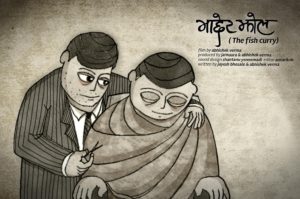
ECSA 2020 Short Film Review “Maacher Jhol”
NO TRAILER CURRENTLY AVAILABLE
First, the Recap:
When in need to make an important proclamation, especially one whose ramifications are initially unsure, what better way to smooth things over with the individual you’re going to announce it to than a beautifully cooked meal–their favorite meal. Would this not soften the blow? While pondering such a conundrum, 28-year old Lalit (voiced by Abhishek Verma) settles it in his mind to make the huge step forward and advise his dear father Shushanto Ghosh (voiced by Suraj Ghosh) that he is gay. Making every effort to learn how to cook up an amazing Maacher Jhol (“fish curry”), each moment Lalit spends in preparing is salted with thoughts of his dear love and roommate Ashutosh Gautam.
Taking a surreal, fantastical journey as he cooks, picturing himself and Ashutosh happy and together, Lalit’s longing builds and builds until the moment happens where his father arrives to the home. Gladdened to see his precious son, Shushanto surveys Lalit’s abode before the two sit down to the succulent meal. Of course, when the subject of marriage arrives, it becomes the moment of truth for Lalit, as his father has his own ideas about who Lalit could choose from, much to Lalit’s awkward but quiet disapproval. Finally, choosing his timing, Lalit engages his father with the revelation about who his true love is, and sets in motion a whole new cycle of needed but potentially troublesome disclosure.
Next, my Mind:
After it’s Texas debut at DFW SAFF 2018, writer/director/producer Abhishek Verma’s 12-minute dramatic short comes back to life via the “Shorts Rewind” programming at the 2020 ECSA: Escapist Cinema of South Asia online film festival presented by Jingo Media and sister festivals DFW SAFF and NYC SAFF. Tackling the ongoing dilemma faced by many in India when an individual decides to make the choice to come out, especially to family, there remains the haunting forces of prejudice, hatred, and ingrained familial and societal traditions to face upon doing so. It’s truly a daunting task, and Verma’s approach to reflect one young man’s journey to reveal his true identity to his father over a wonderfully cooked meal calls to mind, frankly, any of us perhaps who’ve needed to share huge but possibly hard news and try to find a way to “soften the blow”.
This film also stood out via its genuinely art-house cinema execution thanks to the visual presentation being offered through animation rather than live action. It gives the narrative a quirky, dreamlike sense in illustrating the path Lalit travels in his mind while anticipating the imminent arrival of his father, allowing him to experience the joy of partnership with Ashutosh in a romantically fanciful and eccentric way. It’s the creative genius of independent film, and Verma certainly found a unique way to express the thematic elements with excellent results.
Given the overall medium the film itself is offered as, it’s hard to necessarily pinpoint specifics when it comes to the “acting” here, as the main gist of any characters involved is completed through voiceover work. However, to still give credit where credit is definitely due, the film features the voiceover work of Verma as Lalit, Ghosh as Lalit’s father Shushanto and Deepa Kumar as Lalit’s mother Indrani, then supporting turns by Amar Chaudhary as Tasleem and Sitaram and Ajay Singhal as Manjeet Khasera, while also featuring the singing voice of Rajesh Pawar. But, ultimately, it really comes down to the animation itself, which as hinted at above, is honestly a character in itself here.
Some might call it rough-looking or even amateur-ish, all dependent on what you choose to define as quality material within this particular channel of visual packaging. For this reviewer, the style of animation chosen just–fit–the story, with the mildly exaggerated features on the characters and its overall more archaic look. The viewer really cannot help but be drawn into it, buckling in for an uncanny ride through reality and the mind as seen through Lalit’s perspective while facing the task at hand. Again, it’s just unconventional cinema, which is what makes it stick out.
In total, with its heartfelt tone, real-world mentality, and a fantastically clever finale that puts an almost humorous twist to hard events, “Maacher Jhol” was truly one of the more offbeat, artistically unique offerings that still did an effective job at what it was aiming to achieve–more awareness, more understanding, more calculated challenge for a country to be awakened so that it might further recognize the need for deeper understanding and openness to see those who choose to come out still be, at the bare minimum, loved as human beings and not some blight to be misunderstood, hated, or erased from minds and hearts.
As always, this is all for your consideration and comment. Until next time, thank you for reading!




